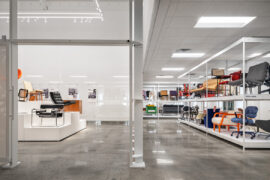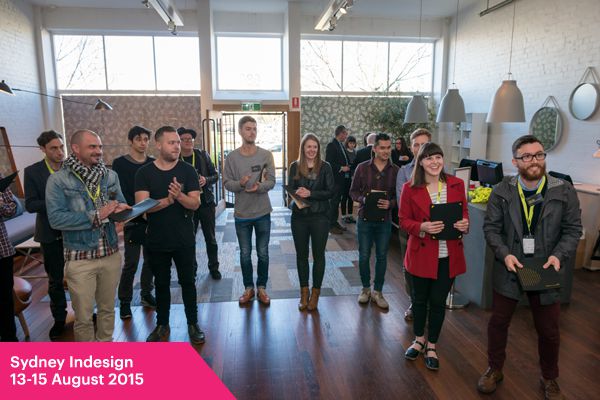The company has revived many of Norman Cherner’s most iconic and well-loved designs.

March 2nd, 2012
In 1999, Benjamin and Thomas, the sons of noted mid-century American furniture designer Norman Cherner, formed The Cherner Chair Company to resurrect many of their father’s designs. This was prompted by the countless requests from architects and designers to make them available once more outside the confines of galleries, museums and the homes of a few fortunate collectors.
The shapely series of chairs from 1958 are some Norman Cherner’s most recognised work, and the demand for them has been particularly spirited!

Norman Cherner’s moulded plywood armchair (1958) and Benjamin’s round table (2003).
Apart from the reissues, The Cherner Chair Company also produces new furniture by Benjamin Cherner such as the round table (above), which was designed to complement the seating.

Side chair (1958)
Great care has been taken to ensure that the designs remain true to the original. The company utilises Norman Cherner’s actual drawings and specifications, and produces the pieces with the same attention to detail found in the original handmade classics.

Wood base stool (1958)
It’s worth noting that although best known for his furniture pieces, Norman Cherner’s portfolio spans virtually all aspects of design, from graphics to glassware to lighting. He is also recognised for his pioneering work in low-cost prefabricated housing.
Cherner designs will be available in Singapore at the end of March at Pomelo Home.
INDESIGN is on instagram
Follow @indesignlive
A searchable and comprehensive guide for specifying leading products and their suppliers
Keep up to date with the latest and greatest from our industry BFF's!

The undeniable thread connecting Herman Miller and Knoll’s design legacies across the decades now finds its profound physical embodiment at MillerKnoll’s new Design Yard Archives.

Rising above the new Sydney Metro Gadigal Station on Pitt Street, Investa’s Parkline Place is redefining the office property aesthetic.

London-based design duo Raw Edges have joined forces with Established & Sons and Tongue & Groove to introduce Wall to Wall – a hand-stained, “living collection” that transforms parquet flooring into a canvas of colour, pattern, and possibility.

The Launch Pad design initiative promotes the support and development of Australian product design through a unique, interactive program of events.
…and the honour goes to Mari Funaki. Read the extract article by Jan Howlin from Indesign Magazine Issue #33 here
The internet never sleeps! Here's the stuff you might have missed

A new book documents the city’s historic building interiors, from 1800s coffee palaces to post-war modernist spaces.

‘The Mandate Mirage: 2025 Workplace Futures Survey’ is a new report by international design practice Hassell, revealing that the real drawcard for attracting employees to the office in-person is choice.

Recognised as winners at the INDE.Awards 2025, Enter Projects Asia in collaboration with SOM have received The Influencer award. Their work on Terminal 2 Kempegowda International Airport Interiors redefines the aesthetics of airport design through a monumental expression of biophilia, sustainability and craftsmanship.